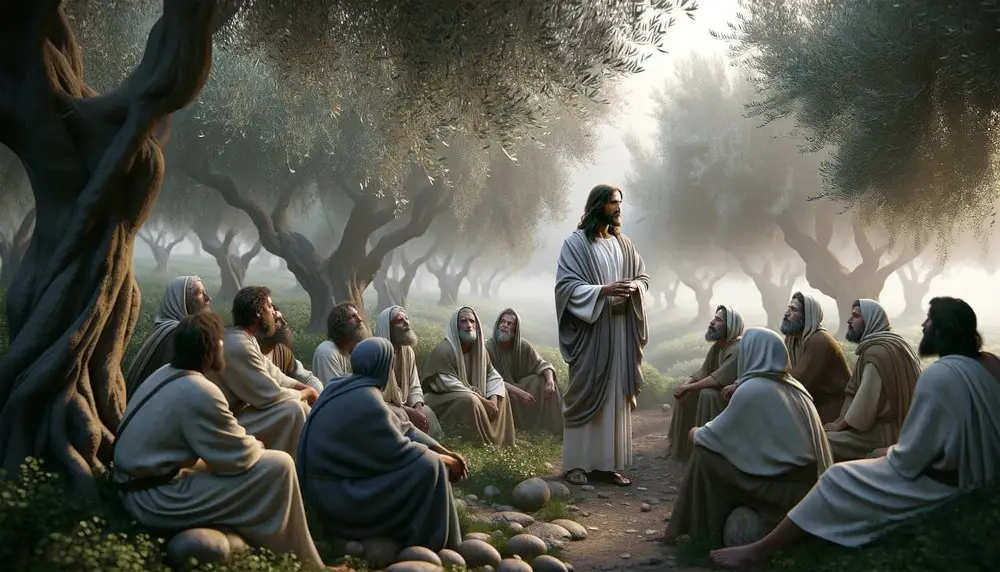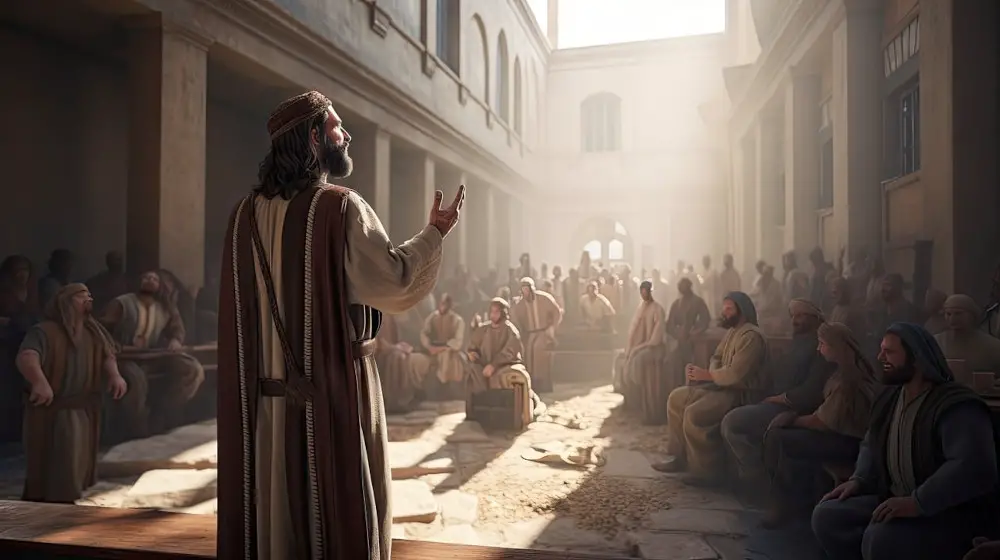I remember the day my perspective on leadership changed forever.
I was rushing to a leadership seminar, gripping my leather bag filled with notes about authority, influence, and getting ahead.
I slid into a seat just as the speaker walked on stage. What he said next stopped me in my tracks.
“True leadership is not about control or status. It’s about empowering others through service and compassion.”
An hour later, I walked out in a daze, my neat and orderly views upended. As I stumbled to my car, one question repeated in my mind:
“Could everything I thought about leadership be wrong?”
That seminar sparked a personal journey that transformed how I view influencers and change-makers.
I discovered the philosophy of servant leadership, rooted in Jesus’ radical example. I learned how it flips conventional wisdom upside down, defining leaders by their willingness to serve first.
As I explored this kingdom mindset, my perspective shifted from “How can I get ahead?” to “How can I lift others up?”
I realized that the greatest leaders reject power for empowerment and status for service. Their authority springs from inspiration, not demanded obedience.
In this blog post, I want to share my understanding of servant leadership. Together we’ll study the biblical roots of this philosophy and how it subverts the world’s model.
We’ll ask what it looks like to lead through compassion and ethics rather than control.
We’ll explore how we can apply servant leadership to inspire positive change in our homes, workplaces, and communities.
I hope you’ll join me on this journey into the upside-down kingdom of God. Who knows? It might just change the way you lead forever.
God Created Humans for Dominion, Not Religion

Here’s something that may surprise you – God did not create humans for religion. Religion only entered the scene after Adam and Eve’s fall into sin.
In God’s original design, humans were made for dominion. Dominion means to govern, rule, control, manage, lead, and master.
God commissioned humans to have dominion over all creation – fish, birds, animals, and the earth itself.
Then God said, “Let us make mankind in our image, in our likeness, so that they may rule over the fish in the sea and the birds in the sky, over the livestock and all the wild animals,[a] and over all the creatures that move along the ground.”
Genesis 1:26 (NIV)
biblegateway.com
This was humanity’s original purpose – to be leaders and stewards of the world under God’s authority. But it required absolute trust and dependence on the Creator.
When Adam and Eve sinned, they lost this intimacy with God. They forfeited their position of dominion and came under the rule of God’s enemy, Satan.
Religion sprang up as a way to try to get back to God. But it could never restore the dominion humans lost. Only Jesus Christ could do that.
Whatever God Calls For, He Provides For

Here’s an amazing truth – whatever God calls humans to do, he equips them to fulfill.
In Genesis 1, God called humans to have dominion over the earth. That meant he designed leadership abilities into our very nature.
Humans were created with the capacity to govern, rule, manage, and lead.
Though sin corrupted human nature, the impulse for dominion remains. There is a hidden leader inside every person, waiting to be unlocked.
This is why influence and leadership come so naturally, even without training. It’s built into humanity’s design.
Of course, our leadership requires development and sanctification by God’s Spirit.
Man Fell From Dominion, Not Heaven

Many people think Adam and Eve fell from heaven or fellowship with God. But Scripture focuses on the loss of their dominion.
Satan tempted them to doubt their identity – “you will be like God” (Genesis 3:4-5).
Tragically, they believed the serpent’s lies over God’s word about who they were.
4 “You will not certainly die,” the serpent said to the woman. 5 “For God knows that when you eat from it your eyes will be opened, and you will be like God, knowing good and evil.”
Genesis 3:4-5 (NIV)
biblegateway.com
Doubting their God-given identity was the original and ultimate sin. Every human problem springs from this root issue – confusion over our identity.
Jesus came to restore what was lost. He showed us what righteous leadership looks like and reconnected us to the Father.
Through Christ, our dominion has been restored. We can now lead like we were created to.
Man Was Not Given Dominion Over Other Humans

In giving humans dominion over the earth, God made one thing clear – they were not to rule over each other.
God uniquely created humans in his image and likeness (Genesis 1:26-27). Therefore, to dominate another person is to violate the image of God in them.
This means positions of human authority must function very differently from how the world typically operates. It’s not about control, status, or privilege.
True kingdom leadership seeks to empower others, not diminish them.
The goal is to serve people’s highest interests, not selfish ambition. We respect others as the image-bearers they are.
Every Human Seeks the Dominion They Lost

Inside every heart is a longing that cannot be fulfilled by this world – the desire for dominion.
Though we search for it in all sorts of earthly pursuits, the craving remains unmet. Possessions, status, pleasure – none of these can restore what was lost.
Many expect heaven to satisfy this inner yearning. But surprisingly, the Bible never promises dominion in heaven. Heaven belongs fully to God.
Humans were designed specifically for leadership on Earth. So it is the kingdom – God’s sovereign rule on earth – that ultimately restores the dominion we seek.
Through Christ, we regain purpose and authority over the enemy and creation. The King has brought his kingdom, along with the dominion humans crave.
Servant Leadership Restores Dominion

The model of leadership Jesus inaugurated is servant leadership. He demonstrated that true dominion is not domination or control. It’s not top-down authoritarian rule.
Instead, like Jesus, servant leaders influence others through service, sacrifice, and love. Their authority comes from the moral example they set.
Servant leaders have a people-centered mindset. They prioritize the needs and growth of others. Their leadership style is compassionate, ethical, and empowering.
They lead by developing potential in others. Their joy is seeing those they serve become activated in their gifts and calling.
Servant leaders reject prideful ambition. Their posture is one of humility, authenticity, and stewardship. By God’s grace, they use their influence morally and wisely.
When we lead through selfless service, we manifest Christ’s upside-down kingdom. This leadership restores the dominion God intended – under His authority and for His purposes.
3 Examples of Servant Leadership in the Bible

1. Jesus is the ultimate model of servant leadership in the Bible.
In every way, Jesus exemplified servant leadership – the use of influence to serve others and meet their needs sacrificially. He is a role model for kingdom leadership.
- He exemplified a serving mindset: He taught his disciples that true greatness comes from serving others (Matthew 20:26-28).
- He modeled humility: Jesus washed his disciples’ feet, showing that the highest leaders should serve in lowly ways (John 13:1-17).
- His leadership was others-focused: He came to serve, not be served – to meet people’s needs before asserting authority (Matthew 20:28).
- He cared for the vulnerable: Jesus had compassion for the helpless and marginalized of society (Matthew 14:14).
- He led through self-denial: He was willing to sacrifice his rights and make himself nothing for the sake of those he came to serve (Philippians 2:5-8).
- He invested in growing leaders: Jesus developed his disciples patiently, preparing them to lead the church after him (Luke 6:12-13).
- He modeled servant leadership: He corrected his disciples’ quest for position and power, showing that kingdom leadership functions differently (Luke 22:24-27).
- His leadership was moral and spiritual, not coercive: Jesus’ authority came from his perfect character and intimacy with the Father (John 5:19-20).
2. Moses was a very humble man (Numbers 12:3)

Moses was far from perfect but exemplified servant leadership in many ways.
His humble service to God’s people models key qualities like compassion, inclusion, and developing others.
- He didn’t seek power for himself: He was reluctant to lead at first, resisting God’s call out of humility (Exodus 3-4).
- He empowered others to lead: When organizing the Israelites, he delegated authority to other leaders based on their giftings (Exodus 18).
- He felt compassion for the people: Moses interceded repeatedly for the Israelites, even after they rebelled against his leadership. (Exodus 32:31-32, Numbers 14).
- He developed future leaders: He mentored Joshua to be his successor and passed on his leadership mantle (Deuteronomy 31:7-8).
- He didn’t assert his authority for the ego: Moses showed remarkable meekness and restraint in the face of opposition (Numbers 12:3).
- He led from spiritual depth: He meditated on God’s presence continually, keeping his leadership dependent on the Lord (Exodus 33:7-11).
- He sacrificed his rights: Even when his own desires were unmet, Moses exemplified service to God and others (Deuteronomy 3:23-28).
- He led by ethical example: His face-to-face friendship with God set a tone of integrity for the nation (Exodus 33:11).
3. Paul’s servant leadership style:

Paul exemplified many facets of servant leadership – mentoring, empowering, loving, suffering, inclusivity, and integrity.
He provides a powerful model of Christlike authority.
- He led through self-denial: He willingly embraced suffering and sacrifice for the sake of serving Christ and others (2 Corinthians 11:23-29).
- He nurtured those he led: Paul’s letters show deep affection and concern for the growth of believers under his care (1 Thessalonians 2:7-12).
- He led with integrity: He worked hard so as not to be a financial burden on those he served in ministry (1 Corinthians 9:12, 2 Thessalonians 3:7-9).
- He developed emerging leaders: Paul poured into mentoring young leaders like Timothy and Titus, entrusting them with responsibility (2 Timothy 2:2).
- He wasn’t threatened by gifted people: He was quick to commend the service, faith, and gifts of other leaders (Romans 16:3-16).
- He sought voluntary followership motivated by love: Paul’s letters appeal more than demand. (Philemon 1: 8-9).
- He was inclusive: partnering across cultural barriers for the advancement of the gospel (Galatians 2:9).
- He led from spiritual dependency: Paul readily confessed his weaknesses and relied wholly on the power of Christ (2 Corinthians 12:9-10).
Key Takeaways
- God created humans for dominion and leadership over creation.
- Sin caused humans to lose this position of dominion.
- Jesus came to restore dominion through his kingdom and the cross.
- Servant leadership aligns with Christ’s model of authority.
- When we lead by serving others, we advance God’s kingdom purposes.
Conclusion
The philosophy of servant leadership contains treasures of kingdom wisdom. It calls us to a style of authority that lifts others up rather than press down people.
Our world desperately needs this caliber of leadership – in homes, churches, schools, businesses, and governments.
Will you embrace God’s model of servant leadership? As you lead through service, empathy, and ethics, you advance the kingdom of God on earth as it is in heaven.
Frequently Asked Questions
Q. What is traditional leadership?
A. Traditional leadership refers to the conventional approach to leading a group or organization, where the leader holds the highest authority and makes decisions without significant input from team members.
Q. What is servant leadership theory?
A. Servant leadership theory is a leadership philosophy that emphasizes the leader’s role as a servant to others, prioritizing the needs of the team members and enabling their personal and professional growth.
Q. Who is considered a team member in servant leadership?
A. A team member in the context of servant leadership includes all individuals within an organization, regardless of their specific role or position, as the philosophy aims to serve the needs of all members within the organization.
Q. What are the principles of servant leadership?
A. The principles of servant leadership are based on values such as empathy, humility, stewardship, and commitment to the growth of others. They guide leaders in prioritizing the needs and development of their team members.
Q. How does servant leadership impact the organizational structure?
A. Organizational structures can be influenced by servant leadership as the focus shifts from a hierarchical approach to a more collaborative and inclusive environment, where the emphasis is on empowering and enabling employees.
Q. What type of leadership approach does servant leadership represent?
A. Servant leadership represents a people-centric leadership approach, where the leader’s primary focus is on serving the needs of the team members and facilitating their success and well-being.
Q. Is servant leadership considered a specific leadership model?
A. Servant leadership is recognized as a distinct leadership model, distinguished by its emphasis on serving others, fostering collaboration, and promoting the personal and professional development of team members.
Q. How does a leader influence employees in servant leadership?
A. A leader may influence how employees feel by creating a supportive and inclusive environment, where the emphasis is on their well-being, growth, and development.






